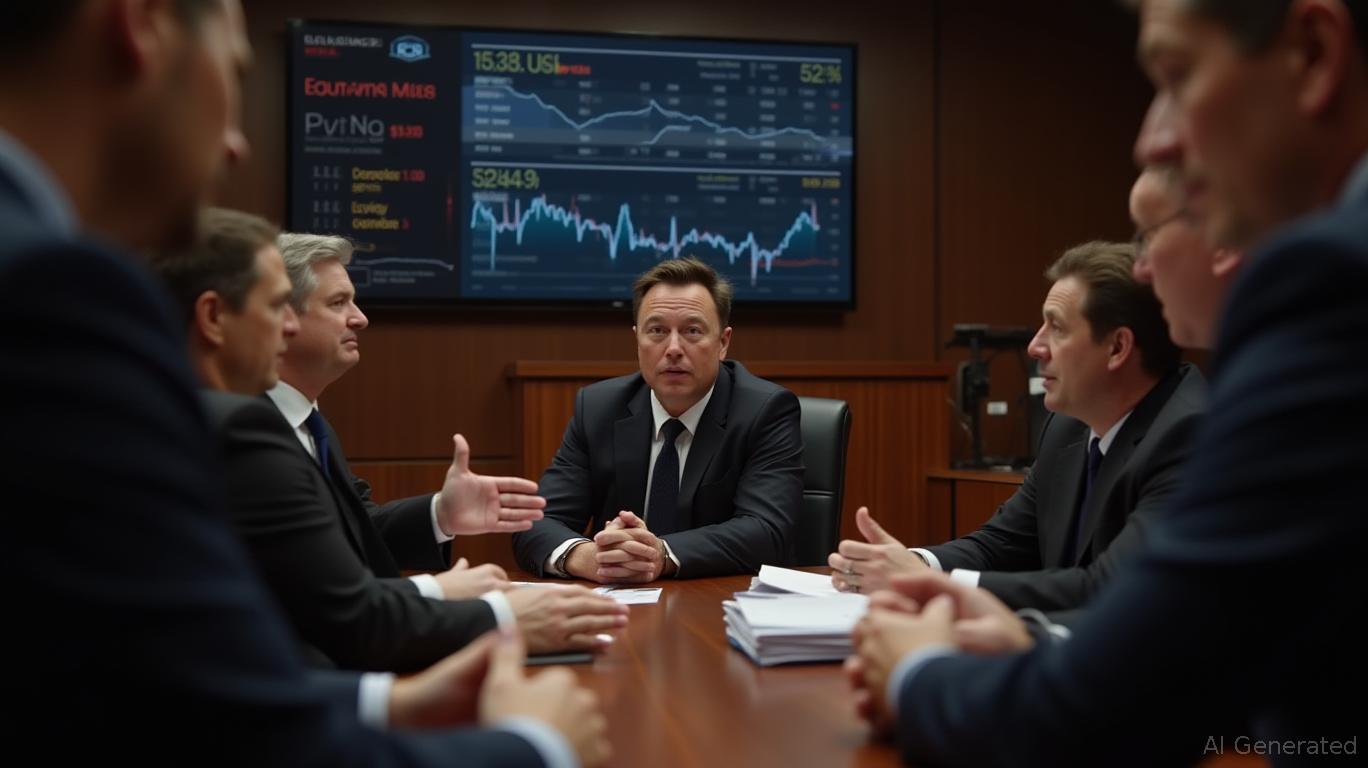Supreme Court and Tesla Investors Challenge Authority and Compensation in Fragmented Markets
- Supreme Court will review Trump's emergency tariffs under IEEPA on Nov 5, testing executive power limits amid conflicting lower court rulings. - Legal experts warn court's decision could redefine congressional-executive balance by validating or invalidating unilateral tariff authority. - Tesla shareholders vote Nov 6 on Musk's $1T pay package tied to AI/robotics milestones, facing governance criticism and potential leadership risks. - Both cases highlight polarized market dynamics: one testing judicial r
Stock futures rose on Tuesday as the market prepared for two major events: the Supreme Court's review of Donald Trump's emergency tariffs and
The Supreme Court will hear arguments on November 5 regarding consolidated lawsuits that challenge the legality of Trump's tariffs under the International Emergency Economic Powers Act (IEEPA). These cases, brought by importers and attorneys general from Democratic-led states, question whether the Trump administration exceeded its authority by imposing broad tariffs on nations such as Brazil, India, and Switzerland, as detailed by the Roosevelt Institute. Lower courts have reached different conclusions, with an 11-judge panel at the US Court of Appeals for the Federal Circuit unable to agree on whether IEEPA allows for such tariffs, the Roosevelt Institute notes. The matter has become a key test for the Supreme Court's conservative majority and its "major questions doctrine," which restricts executive action on significant economic matters—a standard previously used to block Biden's student loan forgiveness plan, as described in a

Legal experts point out that the decision could redefine how power is shared between Congress and the president. If the court rules against the tariffs, it would confirm that Trump's actions lacked legal backing and reinforce limits on unilateral presidential moves, according to the Roosevelt Institute. On the other hand, upholding the tariffs could encourage future presidents to use emergency powers for sweeping policy changes, raising questions about congressional oversight, as highlighted in the Vox analysis. The Trump administration has also used other legal tools, like Section 301 investigations, to create a "parallel structure" that lets it keep certain tariffs in place even if others are struck down, as reported by
At the same time, Tesla shareholders are preparing for a crucial vote on November 6 regarding Musk's $1 trillion pay proposal, which is tied to ambitious targets such as reaching an $8.5 trillion market value and progress in AI and robotics, according to the Hans India article. Board Chair Robyn Denholm has cautioned that turning down the plan could prompt Musk to leave, putting Tesla's "visionary leadership" at risk as it shifts toward becoming an AI-focused tech company, as reported by
Musk has responded by threatening to devote more attention to SpaceX and
Both situations highlight the challenges of reaching consensus in a divided market. For the Supreme Court, the tariffs case will show whether the major questions doctrine is applied impartially or used for political purposes, as raised in the Vox analysis. For Tesla, the shareholder vote will determine if executive pay should be tied to transformative achievements or if it risks setting a precedent for excessive compensation, as the Hans India article points out. As investors await the results, the decisions could have lasting effects on trade, business strategy, and governance standards.
Disclaimer: The content of this article solely reflects the author's opinion and does not represent the platform in any capacity. This article is not intended to serve as a reference for making investment decisions.
You may also like
Spot XRP ETFs May Arrive in Near Future
Trader Predicts Dogecoin November Breakout as Murad’s Memecoin Holdings Drop 59% to $27.5 Million
Sky’s Aggressive Buyback Highlights Crypto’s Creative Edge Amid Regulatory Challenges
- Sky Protocol (ex-MakerDAO) raised daily USDS buybacks to 300,000 and shifted staking rewards to SKY→SKY, aiming to optimize tokenomics via a governance-approved update effective Nov 3. - DEX volume surged to $613.3B in October amid liquidity mining, while Binance led centralized exchanges with $810.4B volume as Bitcoin's 10% drop drove asset repositioning. - Trump's 2025 pardon of Binance's CZ sparked regulatory debates, coinciding with a 15% U.S. crypto investment surge despite $2B Binance-Trump busines

Dogecoin Update: Meme Tokens Hover Near Crucial Support Amid Growing Bearish Signals
- Meme coins DOGE, SHIB, and PEPE face selling pressure as whale activity declines and technical indicators worsen. - Futures open interest dropped sharply (DOGE -3%, SHIB -12%, PEPE -9%), with tokens testing critical support levels. - Death Cross patterns and oversold RSI readings (36-39) signal bearish momentum, while retail-driven rallies lack institutional support. - Market uncertainty persists as Bitcoin's $115k rebound failed to sustain momentum, with ETF applications and volume recovery key future f
